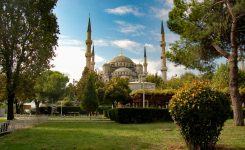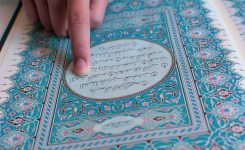Social relations
What Should I Do For My Parents After Their Death?
This book is available for free download:
Question: Allah Almighty have mercy on you! What is your statement in this matter that what rights do parents still have over their children after death?
Question: Allah Almighty have mercy on you! What is your statement in this matter that what rights do parents still have over their children after death?
Questioner: Munshi Shawkat Ali Saheb Faruqi
Answer:
- The first right after their demise is the funeral ritual; bathing [gusl], wrapping in shroud [kaffan], prayer and burial. And to uphold in these the Sunan and advisable [mustahab] acts that offer them hope for virtue, blessings, grace and happiness.
- Constantly supplicate for their forgiveness, never be oblivious about it.
- Continuously pass on to them the rewards of alms and the deeds of goodness and piety. Do not lose your perseverance here. Read your prayers together for them, fast for their sake too. On the contrary, whatever good you do, grant all its reward to them and to all Muslims so that all reward will reach them, and none of the rewards will diminish. It is more likely to gain an immense increase.
- If they have a debt with someone, immediately try to pay it off. And be convinced that paying their debt with your own funds is the happiness of both worlds. If you are not competent, ask for help in this act from friends and relatives, then from the people of goodness.
- If an obligation [fard] remains for them, you must perform the act to the extent that your ability allows. Hajj is not performed, then perform the Hajj on their behalf or have someone else do it. Zakat or Ushr is left on them, then accomplish it. Prayers or fasting are left over, then make up for compensation [kaffarah]. So, deduce the preference, whereby you equifinal try to absolve their responsibility.
- Whatever legal legacy they have left, try to accomplish it as much as possible, even if it is not legally necessary upon yourself, even if it is a burden on yourself. For example, half of the property has been bequeathed to a non-heir relative or merely to a stranger, even if more than a third of the legal property has not been left unconfirmed to the heirs, except it is harmonious for the children to obey the estate and prefer fulfilling their will over one’s own desires.
- Their oath must be fulfilled even after their demise. For example, the parents have vowed that their child will not go to ‘this place’ or meet ‘this person’ or that he will do ‘this work’, after their demise you should not think that they are no longer whose oath must no longer be fulfilled. On the contrary, you must even abide it as they lived, only if it does not violate Islamic law and that part of the oath which only suspends it. In any permitted case even after their demise, it should be abided based on their satisfaction.
- Visit their grave every Friday. Read Surah al-Yasin in such a voice that they can hear it whilst conveying the rewards to their soul. When passing along that street, never leave without giving Salaam and al-Fatiha.
- Be well companionable for their families all your life.
- Uphold the fellowship with their loved ones, always honour and respect them.
- Never speak badly about other people’s parents, making them react badly to your parents.
- The most serious, universal, eternal right is that whatever sin you have commit should never cause them to suffer in their grave. All these actions will consciously reach your parents. They will be happy seeing your good deeds and their faces will glow and shine with joy. And upon seeing sin, they will then become sad and their hearts will tremble. This is not the parents right to receive grief in their graves as well.
May Allah, the Most Merciful, the Infinite Forgiver, the Almighty, the Generous, grant us Muslims, by the merit of His kind and merciful Prophet (peace be upon him), the success of fulfilling good deeds and abstaining from sin. May the graves of our predecessors always receive light, for they are powerful and we are helpless, they are luxuriant, and we are poor.
وحسبنا اﷲ ونعم الوکیل نعم المولٰی ونعم النصیر ولاحول ولاقوۃ الاباﷲ العلی العظیم، وصلی اﷲ تعالٰی علی الشفیع علی الرفیع العفو الکریم الرؤف الرحیم سیّدنا محمّد واٰلہٖ واصحابہٖ اجمعین اٰمین والحمدﷲ ربّ العٰلمین۔
Now for adequate contentment, I will mention a few ahadith from which I, the beggar, has derived these rights:
Hadith 1 – One of the al-Ansar (Allah be pleased with him) presented himself in the noble presence of the Prophet (peace be upon him) whilst asking, “O Messenger of Allah! After the demise of the parents is there any kind of goodness left over for their sake that I can fulfil?” He said, “Indeed! There are four of them: praying for them, supplicating for their forgiveness, fulfilling their legacy, respecting their loved ones, and maintaining well-mannered contact with just their nearby relatives. These are the goodness that are yet to be performed after their demise.” [Ibn al-Najjar[1] narrated it with the story from Abu Usaid al-Sa’idi (Allah be pleased with him). Al-Bayhaqi[2] narrated it from him in his Sunan. He mentions that the Messenger of Allah (peace be upon him) said, “There are four good things for the father’s sake; to pray for him, to supplicate forgiveness for him, to fulfil the legacy, to be well companionable with his family, to respect his loved ones.” [Sunan Ibn Majah: 3664 Sunan Abi Dawud: 5142]
Hadith 2 – The Messenger of Allah (peace be upon him) said, “Well companionship with the parents is that after their demise the children supplicate for their forgiveness.” [Ibn al-Najjar[3] narrated it from Abu Usaid b. Malik b. Zurara (Allah be pleased with him)]
Hadith 3 – said the Messenger of Allah (peace be upon him), “When one leaves the supplication for his parents, he is cut off from livelihood.” [al-Tabarani[4] in his al-Tarikh and al-Daylami narrated it from Anas b. Malik (Allah be pleased with him)]
Hadith 4 and 5 – He (peace be upon him) said, “When any of you do a voluntary good deed, wish it for the sake of your parents so that they will receive its reward and nothing of its rewards will diminish.” [This hadith is narrated by al-Tabarani[5] in al-Awsat and Ibn Asakir[6] of Abdullah b. Umar (Allah be pleased with them) And also narrated by al-Daylami[7] in his Musnad al-Firdaws from Mu’awiyah b. Hayda al-Qushayri (Allah be pleased with him)]
Hadith 6 – A companion (Allah be pleased with him) presented himself, asking, “O Messenger of Allah! During my parent’s lives, I was well companionable to them. Now they have passed away, what is the way to be well companionable for them?” He said, “Well companionship after their passing is that you pray for them together with your own prayer and that you fast with them together with your fast.” [This is narrated by al-Daraqutni][8]
It means that when you voluntarily pray or fast for some extra reward, you then should reward some of your voluntary prayers to them. Prayer, fasting, or any other good deed you do, at the same time intend to send its reward to them so that they will receive it as well and yours will even not decrease. Since the word ‘together’ indicates this because compliance is mentioned in both. Rather, you should do it together is the most appropriate last reason.
It says in Muhit, then in Tatar al-Khaniya then in Radd al-Muhtar: “Whoever does a voluntary charity [sadaqa] is better for him to do it for all believers, for they will receive the reward and the reward in this for himself will not be reduced.”
Hadith 7 – He (peace be upon him) said, “The one who performs the hajj for the sake of his parents or fulfils their debt will be raised amongst the pious on the Day of Judgment.” [This is narrated by al-Tabarani[9] in al-Awsat and al-Daraqutni[10] in Sunan from Ibn Abbas (Allah be pleased with them)]
Hadith 8 – Amir al-Mu’minin Umar al-Faruq al-Azam (Allah be pleased with him) had a debt of eighty thousand, at the time of his passing he called his son ‘Abdullah b. Umar (Allah be pleased with them), saying: “My debt, sell my property first. If it is enough, so be it! Otherwise, fulfil it by asking my tribe Bani Adi. If it is still not enough, ask the Quraysh and besides them do not ask others.” Then he said to his son, “You warrant my debt.” So, he warranted it, and before the burial of Amir al-Mu’minin, the elder companions and al-Ansar witnessed that those eighty thousand will now be his responsibility. Not even a week has passed and Abdullah (Allah be pleased with him) has already repaid the entire debt. [Narrated by Ibn Sa’d in his al-Tabaqat[11] from Uthman b. Arwah]
Hadith 9 – A lady (Allah be pleased with her) from the tribe of Juhayna presented herself in the noble presence of the Prophet (peace be upon him) whilst asking, “O Messenger of Allah! My mother swore to do the hajj. She was unable to fulfil it and she already passed away. Can I fulfil the hajj on her behalf?” He said, “Yes, perform the hajj on her behalf. Had there been a debt upon your mother, would you have it fulfilled or not? Likewise, fulfil Allah’s debt, for He has the most right to it.” [Narrated by al-Bukhari[12] from Ibn Abbas (Allah be pleased with them)]
Hadith 10 – He (peace be upon him) said, “When someone performs the hajj on behalf of his parent, the hajj will be fulfilled for him and his parent’s sake. And their souls in the celestials will be happy with it, and to Allah this person will be written down as a well companionate of his parents.” [Narrated by al-Daraqutni[13] of Zaid b. Arqam (Allah be pleased with him)]
Hadith 11 – The Messenger of Allah (peace be upon him) said, “Whoever performs the hajj on behalf of his parents, then the hajj will be fulfilled for their sake, and it will be rewarded with an additional 10 hajj.” [Narrated by al-Daraqutni[14] from Jabir b. Abdullah (Allah be pleased with them)]
Hadith 12 – He (peace be upon him) said, “Whoever performs the hajj on behalf of his parents after their demise, Allah will record him as liberated from hellfire. And both have the full reward of the hajj in which nothing is actually reduced.” [Narrated by al-Asbhani in al-Targhib and al-Bayhaqi in Shu’b[15] from Ibn Umar (Allah be pleased with them)]
Hadith 13 – He (peace be upon him) said, “The person who upholds the vow of his parents after their demise and fulfils their debt and does not curse other people’s parents so that they do not curse your parents will be written as the well companionate of the parents, even if he had been disobedient in their lifetime. And whoever does not uphold their vow and does not fulfil their debt, and curses other people’s parents making them curse your parents back, will be written down as disobedient, even if he was a well companionate in their lifetime.” [Narrated by al-Tabarani in al-Awsat[16] from ‘Abd al-Rahman b. Samurah (Allah be pleased with him)]
Hadith 14 – He (peace be upon him) said, “Whoever visits both or one of his parents’ grave every Friday, Allah forgives his sins and he will be written down as the well companionate of his parents.” [al-Imam al-Hakim ‘Arif Billah al-Tirmidhi[17] narrated it of Abu Hurayra (Allah be pleased with him) in Nawadir al-Usul][18]
Hadith 15 – He (peace be upon him) said, “The person who visits both or one of his parents’ grave on Friday and reads Surah al-Yasin there, will be forgiven.” [Narrated by Ibn ‘Adi[19] from al-Siddiq al-Akbar (Allah be pleased with him)] And it is further stated: “Whoever visits every Friday one or both graves of his parents whilst reciting Surah al-Yasin there, as many letters as there are in Surah al-Yasin Allah will ordain forgiveness according to all counted letters.” [Narrated by al-Tirmidhi, al-Khalili, Abu Shaykh, al-Daylami, Ibn al-Najjar, al-Rafi’ and so on, from Umm al-Mu’minin al-Siddiqa and she from her noble father al-Siddiq al-Akbar (Allah be pleased with them) and he from the Prophet (peace be upon him)]
Hadith 16 – He (peace be upon him) said, “Whoever visits with the intention of blessings to one or both of his parents’ graves receives the reward in likeness for completing the hajj. And whoever visit oftentimes his parents’ graves, the angels will come to visit his grave.” [al-Hakim, al-Tirmidhi and Ibn ‘Adi narrated it from Ibn Umar (Allah be pleased with them)]
Imam Ibn al-Jawzi al-Muhaddith in his Uyun al-Hikayat with his own narrator chain narrates from Muhammad b. al-‘Abbas Waraq, saying, A person travelled with his son, during the journey the father died. It happened in a jungle around fragrant trees, the son buried it underneath and travelled to where he intended to go. He returned and came to the same place at night, but did not go to his father’s grave. Then he suddenly heard a voice say, “I see you settle in this jungle at night and you do not feel the need to converse with those under these trees. However, the inhabitants who are under these trees are such people that if you were in their place and they would pass by and return here, they would send their greetings over your grave.”[20]
Hadith 17 – He (peace be upon him) said, “The one who wants to be well companionable for his father in his grave must be well companionable for his loved ones and friends.” [Narrated by Abu Ya’la[21] and Ibn Hibban from Ibn Umar (Allah be pleased with them)]
Hadith 18: He (peace be upon him) said, “The well companionate of the father is he who is well companionable for his loved ones.” [al-Tabarani[22] narrated it in his al-Awsat of Anas (Allah be pleased with him)]
Hadith 19 – He (peace be upon him) said, “Verily, the well companionate of the father of all companions is the person who is well companionable towards his loved ones after his father’s death.” [The noble scholars Imam Ahmad, al-Bukhari in his Adab al-Mufrad, Muslim in his Sahih collection, Abu Dawud, and al-Tirmidhi, narrated it from Ibn Umar (Allah be pleased with them)][23]
Hadith 20: He (peace be upon him) said, “Keep seeing the loved ones of the parents, do not break the relationship with them, for Allah will dim your light.” [Narrated by al-Bukhari in Adab al-Mufrad, al-Tabarani in al-Awsat[24] and al-Bayhaqi in Shu’b from Ibn Umar (Allah be pleased with them)]
Hadith 21 – He (peace be upon him) said, “Every Monday and Thursday the deeds are shown to the Prophet of Allah Almighty, and every Friday to the Prophets (peace be upon them) and the parents. They become happy by the good deeds and their faces become completely shiny. So, fear Allah and do not hurt your deceased with your sins.” [Narrated by al-Imam al-Hakim[25] from his father ‘Abd al-Aziz (Allah be pleased with him)]
All in all, the parents have no such right, in which man is ever exempted. They are the reason for his life and existence. So, every favour in this world and the afterlife he will receive is all thanks to them. Because every favour depends on the existence and the cause for its existence is due to them. Thus, having merely parents already legislates a grandiose right, which never can be shirked. Nor in their efforts of his upbringing, suffering for his relief especially the pain of the mother during his settlement in the womb, during birth, and while feeding. How can the appreciation for them ever be fulfilled! In short, they are his phenomenon of refuge, grace and providence of Allah and His Messenger (peace be upon him). Whence, Allah mentions their right alongside His right in the glorious Quran,
أَنِ ٱشْكُرْ لِى وَلِوَٰلِدَيْكَ
“therefore, be thankful to Me and to your parents.” [31:14][26]
In a noble hadith, it says that a companion (Allah be pleased with him) presented himself whilst asking, “O Messenger of Allah! There is a pebbly road that is so hot that when meat is placed on it, it gets cooked. I lifted my mother on my back for six miles. Am I now exempted from her right?” The Messenger of Allah (peace be upon him) said: “The shocks in the pain of your birth that was felt has probably been compensated for one shock.” [Narrated by al-Tabarani[27] in al-Awsat of Burayda (Allah be pleased with him)]
O Allah Almighty deliver us from disobedience and give us success in fulfilling the duties. Ameen. Ameen. By Your mercy, O Most Merciful of those who show mercy. And Allah’s peace be upon Sayyiduna wa Mawlana Muhammad, and upon his progeny, and upon his companions. Ameen. And praise be to Allah, Lord of the universe. And Allah knows best.
al-Imam Ahmad Raza Khan al-Qadiri al-Barelvi
14-Rabi al-Akhir-1320 || ≈ 20-Jul-1902
al-‘Ataya al-Nabawiyyah fi’l-Fatawa al-Ridawiyyah: vol. 24, p. 391, #162
Click for more fatawa’s of Ala Hazrat
[1] Kanz al-Ummal: #45934, 16/579
[2] Sunan al-Kubra: 4/61-62
[3] Kanz al-Ummal: #45449, 16/463
[4] Kanz al-Ummal, al-Tabarani in his al-Tarikh and al-Daylami from Anas (Alah be pleased with him): #45556, 16/482
[5] Al-Mu’jam al-Awsat: #6946, 7/479.
[6] Al-Jami al-Saghir inter-reference to Ibn al-Asakir: #7943, 2/485
[7] Al-Firdaws: #6342, 4/109
[8] Radd al-Muhtar with inter-reference to al-Daraqutni: 2/237
[9] Al-Mu’jam al-Awsat: #7796, 8/393
[10] Sunan al-Daraqutni: #110, 2/260
[11] Al-Tabaqat al-Kubra: 3/358
[12] Sahih al-Bukhari: #1852, #7315
[13] Sunan al-Daraqutni: #109, 2/260
[14] Sunan al-Daraqutni: #112, 2/220
[15] Shu’b al-Iman: #7912, 6/205
[16] Al-Mu’jam al-Awsat: #5715, 6/384
[17] Not to confuse with Imam Muhammad b. ‘Isa al-Tirmidhi of the known canon Jami’ al-Tirmidhi
[18] Nawadir al-Usul: p. 24
[19] Al-Kamil Ibn ‘Adi: 5/1801.
[20] Sharh al-Sudur inter-reference to Uyun al-Hikayat: p. 91
[21] Musnad Abu Ya’la: #5643, 5/260
[22] Al-Majma al-Awsat: #8299, 8/149
[23] Adab al-Mufrad: #40. Sahih al-Muslim: #2552, 2/314. Sunan Abu Dawud: #5143. Jami’ al-Tirmidhi: 1903.
[24] Majma’ al-Awsat: #8628, 9/288. Kanz al-Ummal inter-reference to Tus: #45460, 16/464
[25] Nawadir al-Usul: p. 213
[26] Kanz al-Iman translation by Mawlana Aqib Farid al-Qadiri.
[27] Kanz al-Ummal inter-reference to Tus ‘an Burayda: #45506, 16/473
Majma’ al-Zawaid inter-reference to al-Tabarani, 8/137
Total Page Visits: 1412 - Today Page Visits: 2






